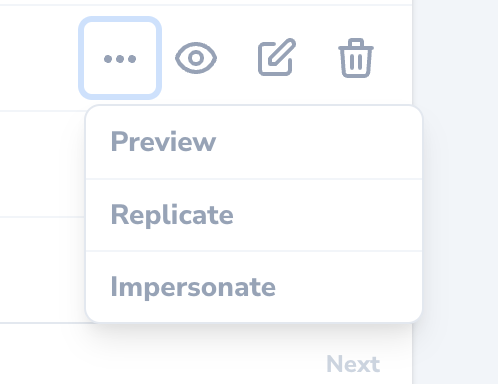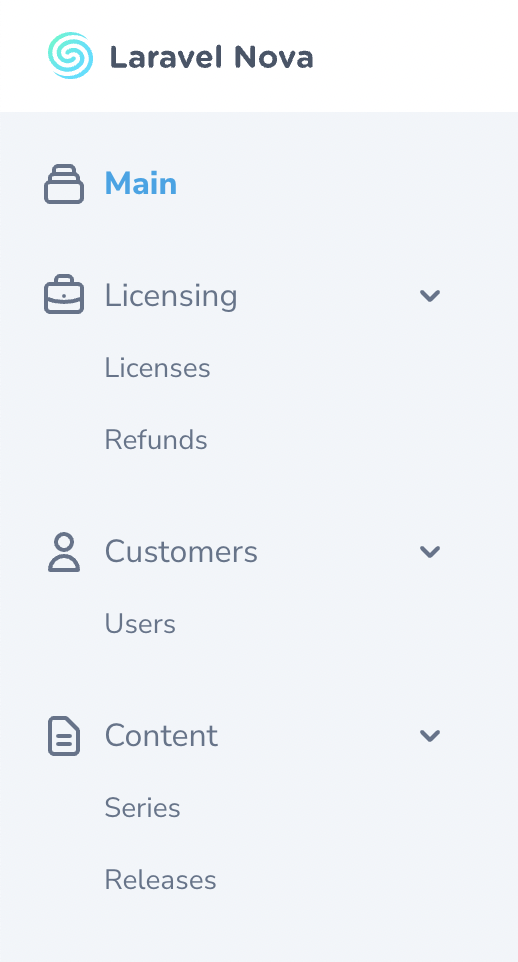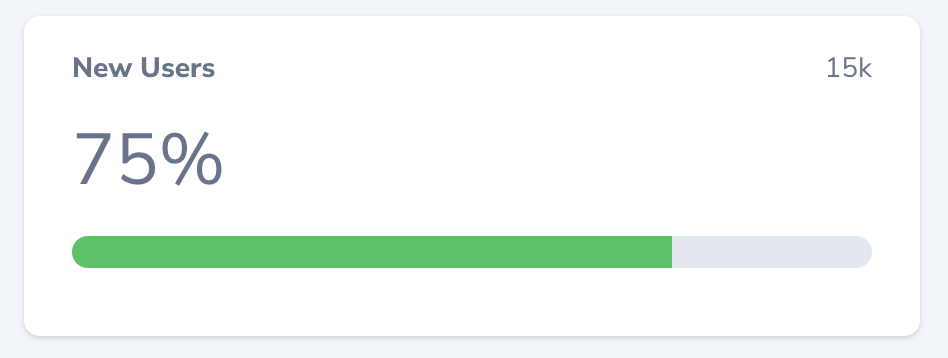Responsive Design
Nova 4 introduces a thoroughly refreshed user interface that is now fully responsive, so you can manage your data on the go:

Painless Branding
A newbrand configuration option has been added to the nova configuration file, allowing you to easily customize the “primary color” and logo used within the Nova interface without the need to create a custom Nova “theme”:

Collapsable Relations
Nova 4 allows you to collapse relations for a given resource type so that they are no longer loaded by default when viewing the relation. Nova will store your collapsed relations in your browser’s local storage so that Nova can remember your preferences. We think you will find that collapsable relationships lead to drastic performance improvements when viewing resource types that have dozens of relationships:
Action Callbacks
The newAction::then method allows you to easily execute code after an action has finished executing against all of its selected resources. This feature allows you to easily generate reports or send notifications when an action has finished executing:
Batchable Actions
Actions may now take advantage of Laravel’s job batching functionality, offering the ability to register batch callbacks that perform additional tasks once the entire batch of actions has finished executing:New Fields
Nova 4 introduces several new field types, includingColor, UiAvatar, MultiSelect, and URL. For more information on using these fields, please consult the field documentation.

Dependent Fields
Nova 4 also introduces support for “dependent” fields. The newdependsOn method allows you to specify that a field’s configuration depends on one or more other field’s values. The dependsOn method accepts an array of dependent field attributes and a closure that modifies the configuration of the current field instance.
Dependent fields allow advanced customization, such as toggling read-only mode, validation rules, and more based on the state of another field:
Filterable Fields
Nova 4 introduces a newfilterable method that allows you to enable convenient, automatic filtering functionality for a given field on resources, relationships, and lenses without creating a custom filter. The Nova generated filter will automatically be made available via the resource filter menu on the resource’s index:

Notifications
Nova 4 also introduces support for “Nova notifications”, a brand new notification menu within Nova that you may use to display information for your Nova users. For example, you could use this menu to notify users that a report has been generated or that an invoice needs attention:
NovaNotification instance to a notifiable user:
Impersonation
After deploying your application to production, you may occasionally need to “impersonate” another user of your application in order to debug problems your customers are reporting. Thankfully, Nova now includes built-in functionality to handle this exact scenario. To enable user impersonation, add theLaravel\Nova\Auth\Impersonatable trait to your application’s User model:
Impersonatable trait has been added to your application’s User model, an “Impersonate” action will be available via the inline action menu for the corresponding resource:

Custom Menus
In addition, Nova now supports totally custom side-bar and user menus. In fact, you can fully customize every link entry in Nova’s left-side navigation bar, including the creation of menu sections, menu groups, and more:
Progress Metric
The new “progress” metric allows you to track your progress towards a given goal. For example, you may wish to track your new user registrations for the month against a target goal. It’s a cinch with the new progress metric:
Resource Replication
Sometimes, you may want to create a new resource while using all of the data from an existing resource as a starting point. Nova’s new resource replication feature does just that. After clicking the replicate button, you’ll be whisked away to a resource creation form with all of the replicated resource’s data hydrated into the form and ready for tweaking:
Resource Preview Modal
The brand new resource preview modal gives you a sneak peek at the resource’s data without leaving the resource index page, providing a great way to learn more about a resource without interrupting your flow:
HasOne::ofMany Support
TheHasOne relationship field can now be transformed into an “has one of many” Eloquent relationship using the ofMany method. For example, let’s assume a User model hasMany Post models. We may add the “has one of many” relationship to our User Nova resource like so:
Inline HasOne Creation
Resources that haveHasOne relationships may now create the data for those relationships directly in the parent resource’s creation form. This new ability makes it a breeze to create the parent resource and its child in one, convenient operation:

Search Improvements
Typically, Nova searches your database columns using simpleLIKE clauses. However, if you are using MySQL or Postgres, you may now take advantage of any full-text indexes you have defined: